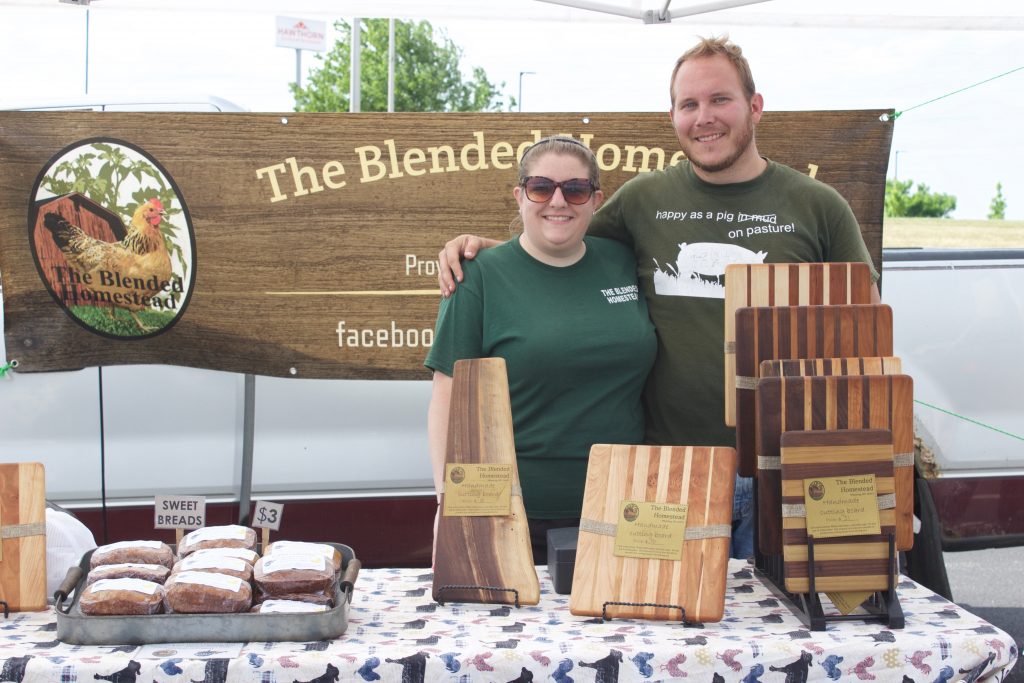
TRIADELPHIA, W.Va. — In his five years of going to farmers markets, Eric Blend, of The Blended Homestead, in Wheeling, West Virginia, noticed markets aren’t always accommodating to all farmers. He and his wife, Brianna Blend, both work off the farm. That’s not uncommon for farmers, these days. And that can make it tough to get to a farmers market every week, all season long.
So, when he started The Highlands Farmers Market in 2020, he made it a goal to give farmers flexibility — and to make sure farmers were leading the market.
“We want to really be able to get other farms to pop up, and help other local small businesses,” Blend said.
The Highlands Farmers Market meets at The Highlands, a shopping destination with stores, dining and other entertainment and services, in Triadelphia, West Virginia, every Thursday during its market season.
At the first market of the season, June 10, there were just three vendors — the most the market has ever had at once was seven. But there’s plenty of traffic around the market, which means plenty of potential customers, explained Nancy Blake, of NJ’s Kettle Corn, one of the vendors.
“We’re in a great spot, I think,” she said. “This market is still a work in progress. I think it will come along nicely.”
Market
Blake started selling kettle corn in 2007, a couple of years after retiring, and met the Blends through other farmers markets in the area. She’s eager to see how things go for this market.
The market doesn’t require farmers to participate regularly. If someone just wants to sell some extra vegetables once in a season, they can do that. And all active vendors at the market are automatically invited to board meetings and get a vote on the board. Blend designed the market to be run as a nonprofit cooperative.
While the market does have some value-added producers, the goal for the new market is for at least half of the vendors to be farmers. Vendors have to produce at least 80% of everything on their tables, and live within about an hour’s drive of the market.
“We’re trying to keep it to where it’s about agriculture; it’s about produce,” said Scott Wade, of Rock Valley Farm, who started attending the market as a vendor last year.

Vendors
While vendors don’t have to attend every week, Blend said, it certainly helps for building relationships with customers. Some customers come to the same markets and buy the same things every week — a few loaves of zucchini bread or a dozen eggs.
“It’s cool to see the customers come through and build those connections,” he said.
Since the market is flexible for vendors, it sometimes draws people who are new to farmers markets. Blend does his best to guide them and is hoping to put together a training for new vendors on some of the things they should think about or plan for — basically, what it’s like to be on the other side of the table.
“Farmers markets are really an incubator for small businesses,” Blend said.
The market also promotes its vendors on social media to help them connect with customers even before the market starts.
“We try to work together and use social media to really be a farm tour that’s on your smartphone,” he explained.
Before joining the market, Rock Valley Farm already sold produce and eggs from an on-farm stand, just a few miles away, but the market was an opportunity to reach more people.
“It’s the same community,” Wade said. “Just a different spot and more people.”
At the first market he visited in 2020, he brought about 40 dozen ears of sweet corn and sold out of it in less than an hour. He and his family also started selling beef last year, after the county fair his children planned to show and sell steers at shut down. They got licensed, got a steer processed and started selling the meat at the market. His daughter got to keep the proceeds.
“We got hooked on it,” Wade said.

Pandemic
Blend wasn’t sure exactly how many customers they had last year, but knows that they did well, especially in June. Being at The Highlands helps, since there’s already traffic there for the other shopping in the area.
Plans for the market were in the works before the pandemic hit in 2020. The pandemic definitely had an impact — some vendors and customers were less inclined to come out for farmers markets, due to safety concerns. But the location helped, Blake said.
“It was still busy,” she said. “It didn’t hurt us badly.”
Vendors at the Highlands market all wore masks and did what they could to allow for social distancing. They held off on adding musicians and cooking demonstrations to the market — something they’re looking into for the 2021 season.
Future
The West Virginia farm bill, passed recently, streamlined regulations for farmers markets in the state, allowing vendors to get approval from the department of agriculture only, instead of looking to local health departments, as well. That will make things easier for vendors in the future, Blend said.
Blend is looking forward to seeing what the second year brings.
“We’re still constantly learning,” he said.
Blend has also worked with restaurants, like the Wheeling Brewing Company, on farm to table dinners. Those types of events help get people interested in local restaurants, and in local food.
“We’re always trying to think of different ways to grow our businesses together,” he said. “We know that a strong local economy is going to take everybody working together and thinking outside the box.”









